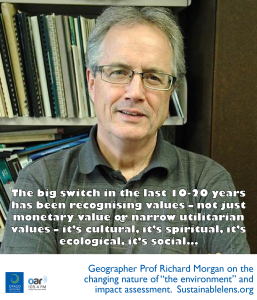There will be conflict, so we need people to recognise those different values.
Prof Richard Morgan teaches and researches environmental management and impact assessment in University of Otago’s Geography Department. A biogeographer who initially worked on the New Forest, his interests broadened to include the investigation of the impacts human activities on soil systems, and from there to the total environment, including humans. He now applies impact assessment to a diverse range of areas such as Health Impact Assessment.
Talking points
(Water is a resource management problem) – we have to measure what is available, how do we understand the demand for that, how we understand what are the competing demands and how they affect each other, what sort of decision making process is appropriate? Do we simply put a price on water and let people with money buy as much as they need? or do we have some sort of collaborative allocation process?
Water is one of the most contentious issues globally – between communities, between nations. Building dams and denying flows across boundaries, who has access to drinking water and who doesn’t. So understanding how much there is, understanding the seasonal cycles, the natural disruptions to supply, how many droughts we’re going to get in the next 50 years, this is all about having a good understanding that we can then feed into decisions about allocation and sensible usage.
Environmental management is coming in from a different perspective compared to management of an organisation, but we’re still trying to instill professional thinking about how we deal with that.
(Management doesn’t tend work at very long time scales, or to work in areas of finite resources or irreversible decisions) No, and they do have a habit of imposing a discount on their cost/benefit analysis that is ludicrous if you try and do that in natural resources – it just doesn’t work, but that’s not insurmountable.
Different time scales, different spatial scales, being aware of that, and recognising the issues that can arise in those different temporal, spatial scales is important.
The big switch in the last 10-20 years has been recognising values – not just monetary value or narrow utilitarian values – it’s cultural, it’s spiritual, it’s ecological, it’s social – how we take that into account is quite an important area of discussion.
Decision makers are now much more aware that they can’t just take a number, and say “we’ll go with the number and not these expressions of opinion”, now they might be more swayed by good, well founded passionate opinion from a local community than an accountant saying “this is worth so many dollars”.
(Book reference: Stone – do trees have standing? )
How do we play that in our value systems? Deep ecologist: of course. Utilitarian ecologist: well a healthy ecosystem needs those species, we can’t do without them, if we take them out the system is degraded… so it depends on how people what to consider it on a personal philosophical level – then my job as an academic is to point people to those values and say “so what do you think?”.
There will be conflict, so we need people to recognise those different values.
It’s values, every time.
That expression of value is becoming much more important…with increasing recognition of Maori values sets over water, for example, there has had to be a recognition of a holistic sometimes spiritual and ecological and utilitarian set of values.
Sustainability is a moral stance
The sustainability word is problematic because it does take on different meanings for different people, and it doesn’t matter how many academic publications there are saying there are these 5-10 different types of sustainability, that term is owned by the wider population and they will use it as they see fit.
I think what is more important is the ethos, the basic ethos that we need to think carefully about how we live, and how that affects the environment that includes people.
We are making choices every day in what we do, and we need to be thinking about how some of those choices might be having rather unfortunate effects, especially in the longer term.
Fashions change in terms of issues, but the basic ethos that has emerged is human as a species need to think very carefully about how we live, how we use resources – we’ve got to be much more efficient about how we reuse, we’ve got to be much more careful with things that can’t be be reused, choose resources that are not going to pollute to the same extent – I think that message is widely understood. Sustainability is a label that sort of goes over that but perhaps is a bit fuzzy. Maybe we should just talk about the ethos and not worry about the label.
(Motivation?) I’m still keen on being a university academic, every year there’s new minds coming in, new challenging questions, it makes us stop, rethink, perhaps change positions. It’s energising and rejuvinating every year, constantly being challenged.
(Are the new minds changing?) they do want jobs, but still they question and challenge.
(Activist?) No, prodder, questioner. I tend to be in the background. I want to stimulate people’s thinking. I think we have to be quite careful about that – we can’t stand up and say “I’m a professor of geography and therefore my value set should influence you”. But I can stand up and say “me personally, I think this, what do you guys think?”.
(Challenges?) Hand over area of work in impact assessment nationally and internationally – but not fade away too much.
(Miracle?) Solution to sequestering carbon
We shouldn’t be relying on a technical fix, but we should be trying our hardest to cover our options.
(Advice?) Get a good night sleep.

